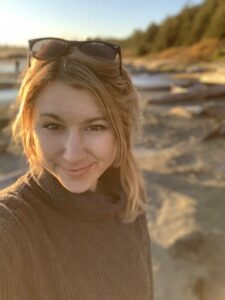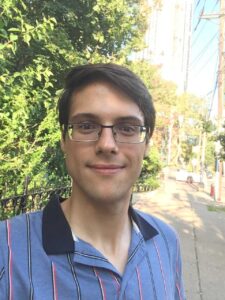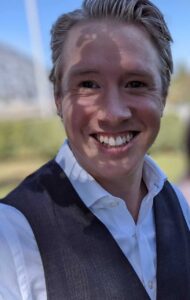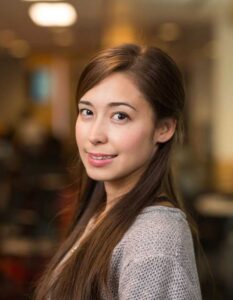Congratulations to the PhD graduates of the Graduate Program in Neuroscience (GPN), fall class of 2023! Six trainees are graduating this week and to celebrate, we asked them for some of their favourite memories during their time at UBC, future plans and advice for future students.
Alyssa Ash, PhD
 Supervisor: Dr. Jason Snyder
Supervisor: Dr. Jason Snyder
Thesis title: Hippocampal neurogenesis and the entorhinal-dentate gyrus circuit under healthy and pathological conditions.
Summary of research: My research looked at the impact of neurogenesis on hippocampal activity and examined newborn neuron structure across the lifespan with an early-stage Alzheimer’s-like mouse model. As well, we examined behavioural changes under this model and provided evidence that developmentally-born and adult-born neurons are both susceptible to damage in preclinical disease stages.
Advice for future students: Teamwork makes the dream work, tacky but true. Work and communicate with your labmates and colleagues often. It’s easy to spiral alone on your study and become discouraged (speaking from experience) so lean on others! And don’t forget to socialize outside of lab often, grad school friends are for life, especially since you go through so much together over the years.
Tristan Dellazizzo Toth, PhD
 Supervisor: Dr. Kurt Haas
Supervisor: Dr. Kurt Haas
Thesis title: Fast imaging reveals how experience modifies neural structure and function in an awake brain.
Summary of research: I developed tools and technologies to be able to record the complete array of activity across a single neuron as well as tracking its structural and functional changes. I use these novel capabilities to be able to perform experiments that demonstrate how sensory input produces patterned changes in neural structure and function.
Advice for future students: In research, setbacks and challenges are inevitable, but you can overcome them so do not get discouraged! Make sure to take the time to form friendships with your fellow students and to be involved in campus life as it will be invaluable for enriching your quality of life.
Todd Kamensek, PhD
 Supervisor: Dr. Ipek Oruc
Supervisor: Dr. Ipek Oruc
Thesis title: Social motivation, visual experience, and face recognition in autism spectrum disorder.
Summary of research: My research examined the reciprocal relationship between social interest, visual experience, and face recognition abilities in autism spectrum disorder. My findings challenge the notion of a single cause for face recognition challenges in autism and may pave the way for potential interventions aimed at improving these abilities.
Favourite GPN memory: I loved taking classes in the beginning of my program in the beautiful lecture rooms at DMCBH. I also loved the opportunities I had to teach, specifically the students in the Behavioural Neuroscience program. To help develop the lab portion of PSYC 277 with my supervisor and see that course grow and improve was very special. Teaching a cohort of those students in PSYC 370 was icing on the cake and a highlight of my experience at UBC.
Advice for future students: Join lots of clubs, attend all the events you can, attend journal club, develop as many skill sets as you can, and do a collaboration with a classmate! Most importantly, don’t forget that failing to reject the null hypothesis is no failure at all, you have simply narrowed down the list of potential explanations. You might not remember every long night writing or completing data analysis, but you will remember the amazing people you met, the times awkwardly making new connections at conferences, and the amazing talks you may have witnessed (or given) along the way.
Maya Nesbit, PhD
 Supervisor: Dr. Anthony Phillips
Supervisor: Dr. Anthony Phillips
Thesis title: Prefrontal cortex mechanisms of the novel cognitive enhancer d-govadine.
Summary of research: My project focused on understanding the mechanisms of d-govadine, a novel dopaminergic ligand synthesized at UBC that we and other labs have previously shown to enhance and restore impairments in working memory and behavioural flexibility. I found that d-govadine acts directly in the prefrontal cortex to facilitate prefrontal cortex dopamine function, and that it’s actions likely involve a dopaminergic feedback loop between the prefrontal cortex and the ventral tegmental area. I also found that d-govadine acts through D1 receptors to potentiate NMDA current in prefrontal cortex neurons, a mechanism that is likely to provide an additional boost to prefrontal cortex-dependent cognitive functions.
Future plans: I’m starting a post doc at UCSF with Vikaas Sohal, continuing to study the prefrontal cortex dopamine system.
Advice for future students: Although our field of work is very results-driven, my advice is to enjoy the process of research and celebrate the small wins as they come.
Hong Lu, PhD
Supervisor: Dr. Ann Marie Craig
Thesis title: Modes of regulation for neurexin-1 function at hippocampal synapses.
Tianrui Zhang, PhD
Supervisor: Dr. Jason Snyder and Dr. Fidel Vila-Rodriguez
Thesis title: Effect of non-invasive neurostimulation on hippocampal plasticity and memory.


